 pdf editor primary" width="1024" height="683" />
pdf editor primary" width="1024" height="683" /> pdf editor primary" width="1024" height="683" />
pdf editor primary" width="1024" height="683" />
PDF files have become a major part of our digital lives in this cross-platform world. While simply viewing or commenting on a PDF can be accomplished with free software, there are times when we need to engage with a PDF more extensively, making edits or reorganizing a file. That’s where a PDF editor comes in.
The best PDF editors allows you to edit, create, alter, and convert PDF files just like you would with any other text document. Adobe Acrobat is the most famous option for most people. But while it’s excellent both in features and utility, it’s also pretty expensive.
Thankfully, in recent years a whole host of third-party PDF editors have sprung up in order to provide less expensive alternatives. (If you’re wondering why Windows doesn’t have a decent PDF editor, you’re not alone.)
Our picks cover the gamut of PDF editing needs and budgets.
Why you should trust us: At PCWorld, we’ve been testing PC hardware and software for over 40 years. Our evaluation process is always hands-on and thorough, taking into account real-world usage needs. We don’t ever recommend something we wouldn’t be comfortable using ourselves. To learn more about our criteria for PDF editors scroll to the bottom of this article.
Tip: Want to know how to sign a PDF document without having to print it out first? See our how-to on signing a PDF electronically.
EaseUS PDF Editor – Edit, Convert, Compress & Protect PDFs
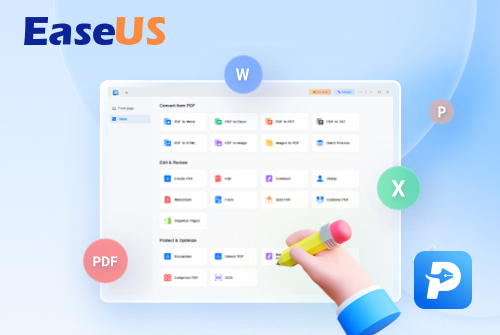
Integrate PDF maker, PDF editor, PDF converter, and PDF reader in one full pack with all the basics you need. The clean interface simplifies your PDF work to edit, convert, comment, annotate, merge, split, background, page, watermark, sign PDFs, or fill forms. Your PDF workloads are down by batch processing efficiently.
Now 25% OFF Exclusive Code: PCWORLD25
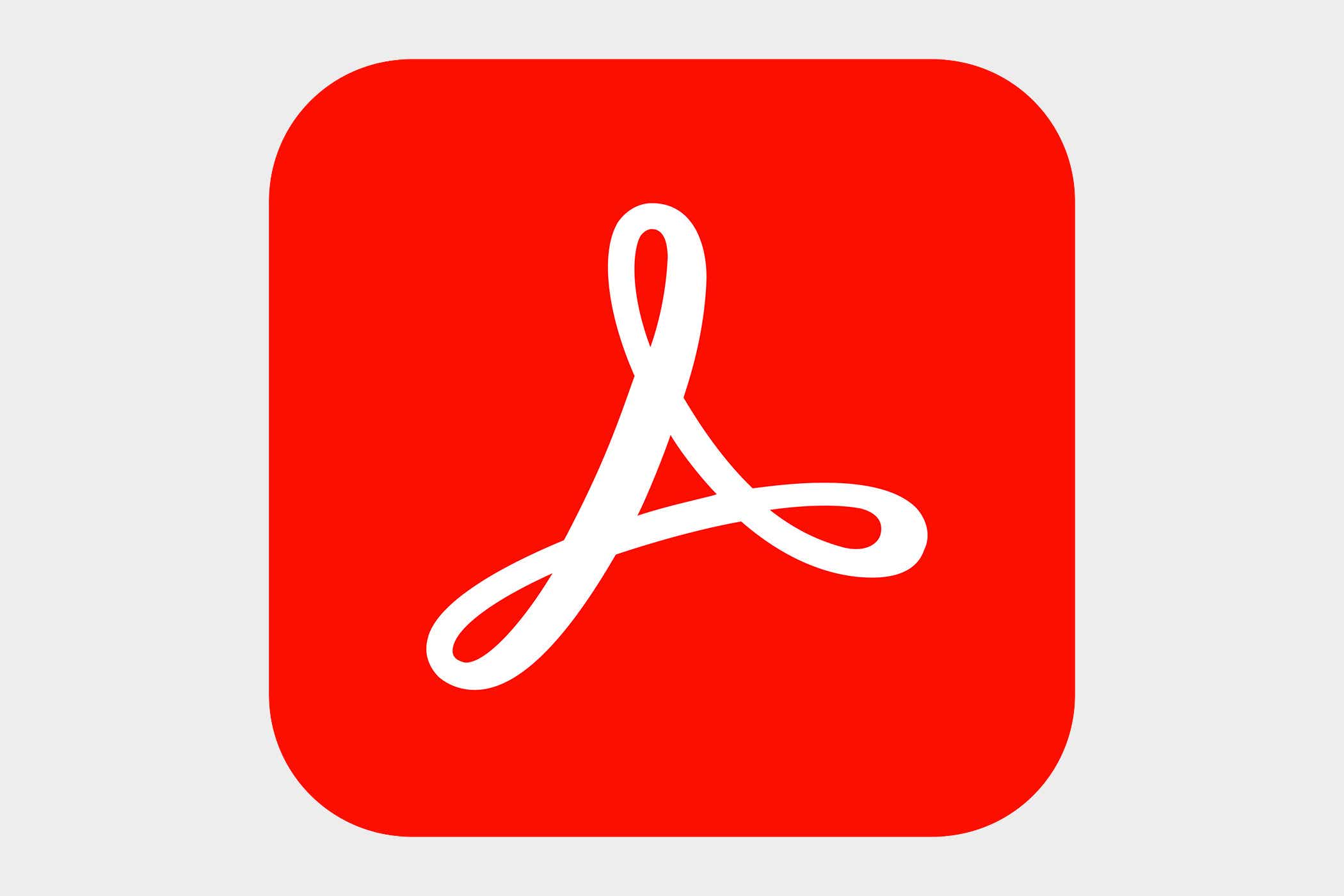
Adobe Acrobat Pro remains the industry standard for good reason. Its rich combination of creation, editing, reviewing, and security features are mimicked by the best alternative options, but we feel Acrobat still does it best. Its recent interface redesign makes it much easier to navigate through its robust toolset than the nested menus of yore, and its cloud subscription option puts its advanced features within reach of more individuals and small businesses. (See how it compares to the Adobe Acrobat Standard.)
Though many of its features are available in other, cheaper PDF editors, Acrobat is still the editor against which all others are judged. And, as of this year, it’s also the first PDF editor that we know of to incorporate AI into the feature mix.
Read our full Adobe Acrobat Pro review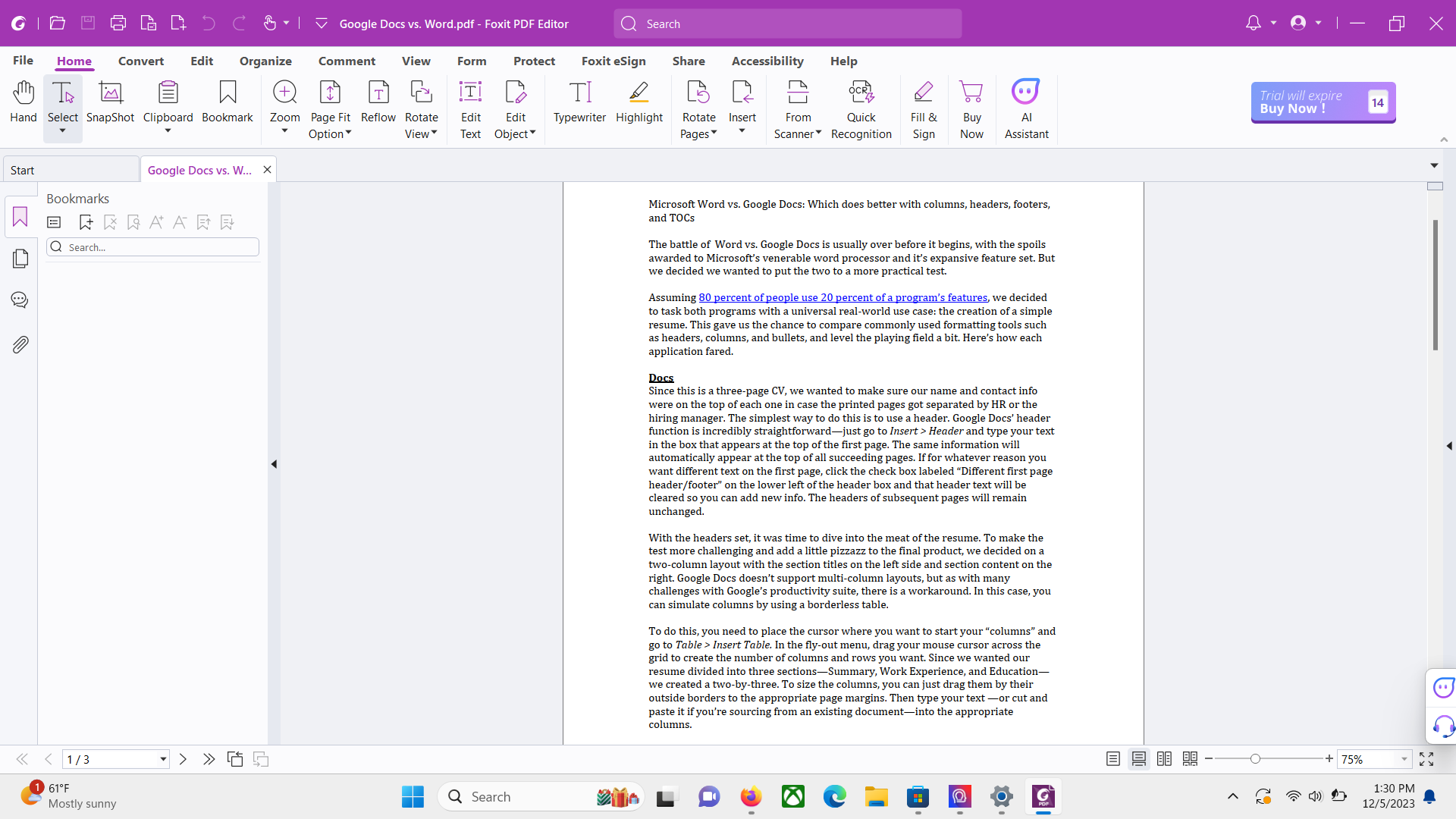
Foxit PDF Editor 13 hits all the right notes for a premium PDF editor and can even take on the formidable Adobe Acrobat. It’s packed with features that are sure to please power users—all the requisite content editing tools; review and markup features; form fill and signing support; and robust security options for sensitive documents, such as permissions, password protection, and data redaction. It supports tons of file formats, and adding hyperlinks, images, and files to a PDF is trouble-free.
Indeed, ease-of-use is one of Foxit’s great strengths. The program uses a Microsoft Office-style ribbon interface which groups tasks in a familiar and intuitive interface, making for a seamless integration with your workflow. It also provides ChatGPT integration so you can easily get help with your documents from an AI assistant. Yes, it’s priced on the higher side for a PDF editor, but with all it has going for it, Nitro PDF Pro more than earns its keep. Plus, you can try it out for free for seven days to see if you like it before making a commitment. If you’re looking for an Acrobat replacement, you won’t find many better.
Read our full Foxit PDF Editor review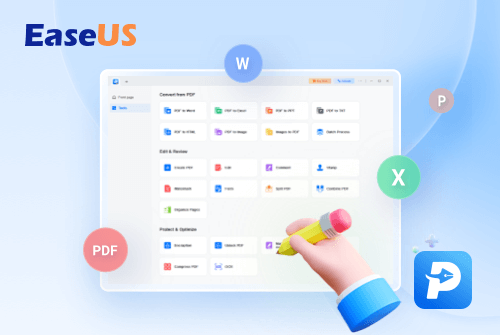
EaseUs might not have the name recognition of some of the other editors on this list, but it’s more than capable of holding its own in the crowded PDF editor market. It provides all of the essential tools for managing PDF files without any of the elaborate or hard-to-understand features. It allows users to jump right in to their toolset and get straight to editing with only what they need.
While EaseUS’s features are great, they are also pretty standard fare among PDF editors. What makes it stand out is its affordable price—it’s a great value for those who regularly edit PDFs and don’t want to pay out the nose. EaseUS also offers a fully functional free version (with embedded watermarks on your edited documents) so users can take it for a spin to see if it meets their needs before they commit to paying any money.
Read our full EaseUS PDF Editor review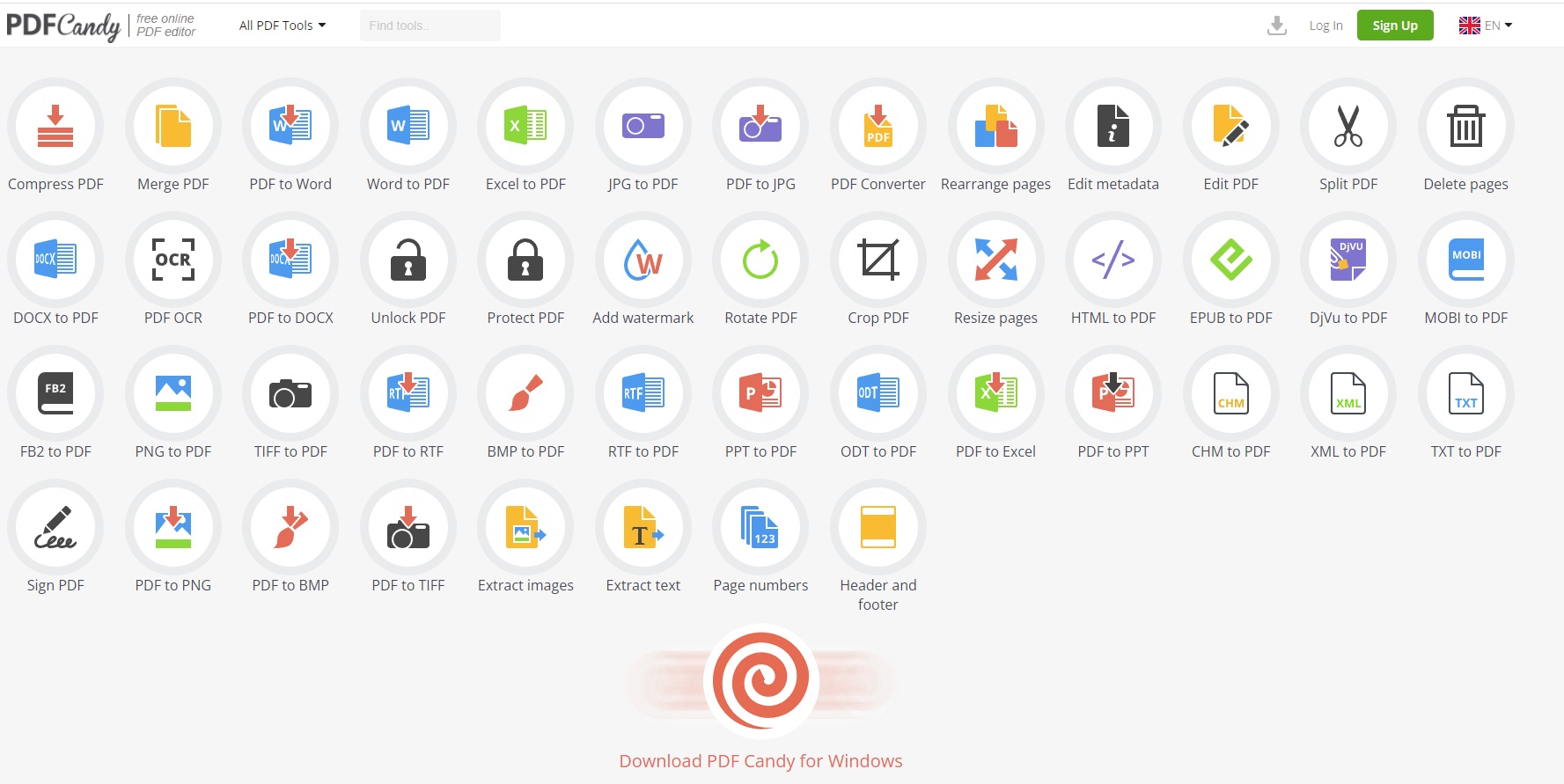
PDF Candy is the rare free PDF editor that offers a lot of the features you’d typically have to pay for. We’re talking scanning, multiple file-conversion options, and OCR functionality. All of this combines to make PDF Candy stand out among the multitude of lesser free PDF editors. It does have a bit of a wonky interface, but once you get the hang of it you’re off and running.
Unfortunately, while the free version has access to the expansive toolset of the paid version, you’re limited to one PDF task per hour. If you want unfettered access, you need to shell out $6 per month, or $48 per year.
Read our full PDF Candy review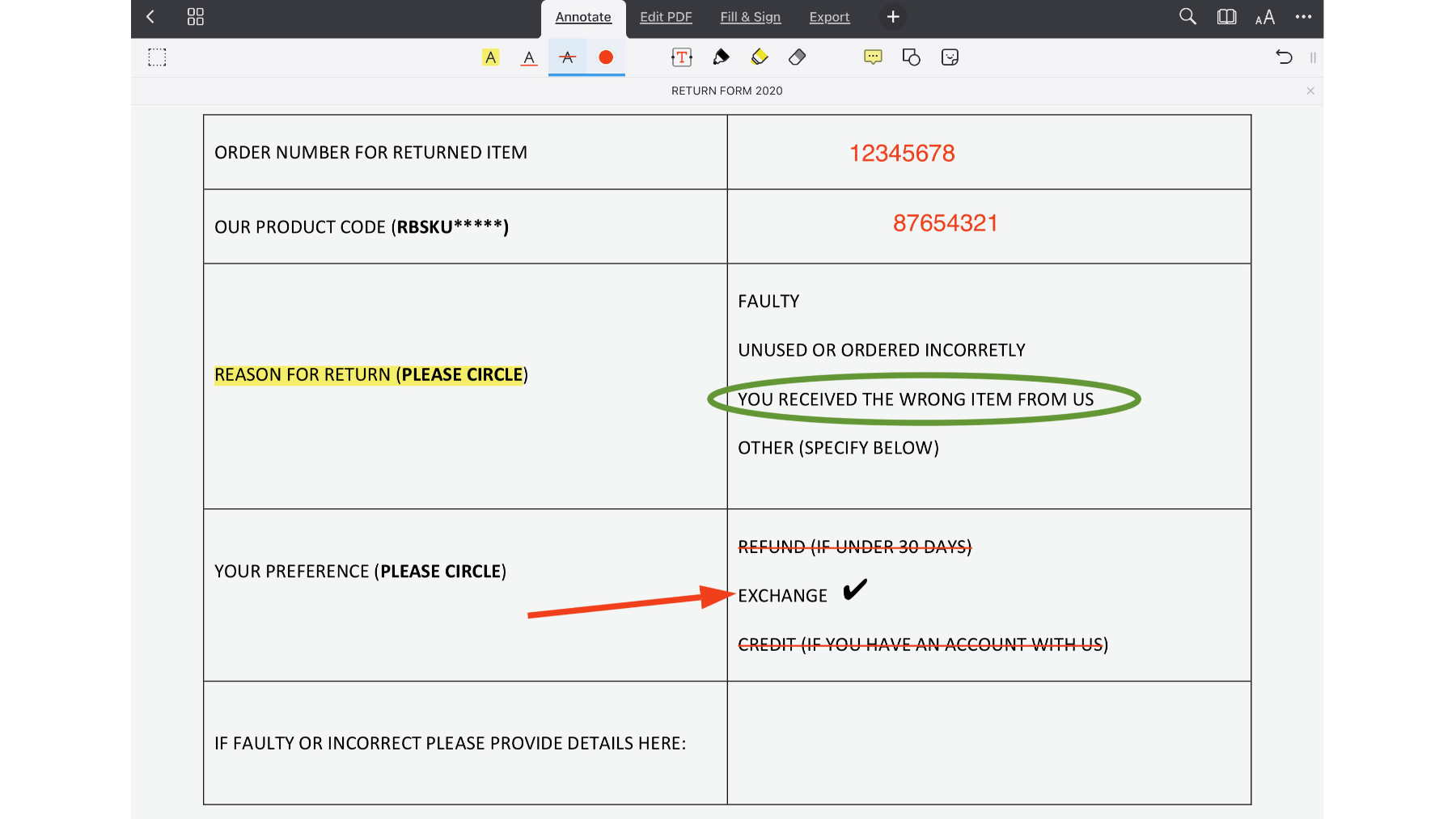
PDF Expert is an excellent editor that fits seamlessly into the Apple ecosystem, making it our pick for Macs, iPads, and iPhone users.
While macOS does include a PDF editor in its Preview app, iOS devices don’t have a native PDF editor and PDF Expert fills that gap nicely. It has a clean and intuitive interface and offers a plethora of easy-to-use editing options such as page management, converting scanned files into editable documents, and conversion to other file formats, among other things. The pricing plan is also considerably cheaper than most of the other top picks, meaning this is a no-brainer for Apple users.
Read our full PDF Expert (iOS) review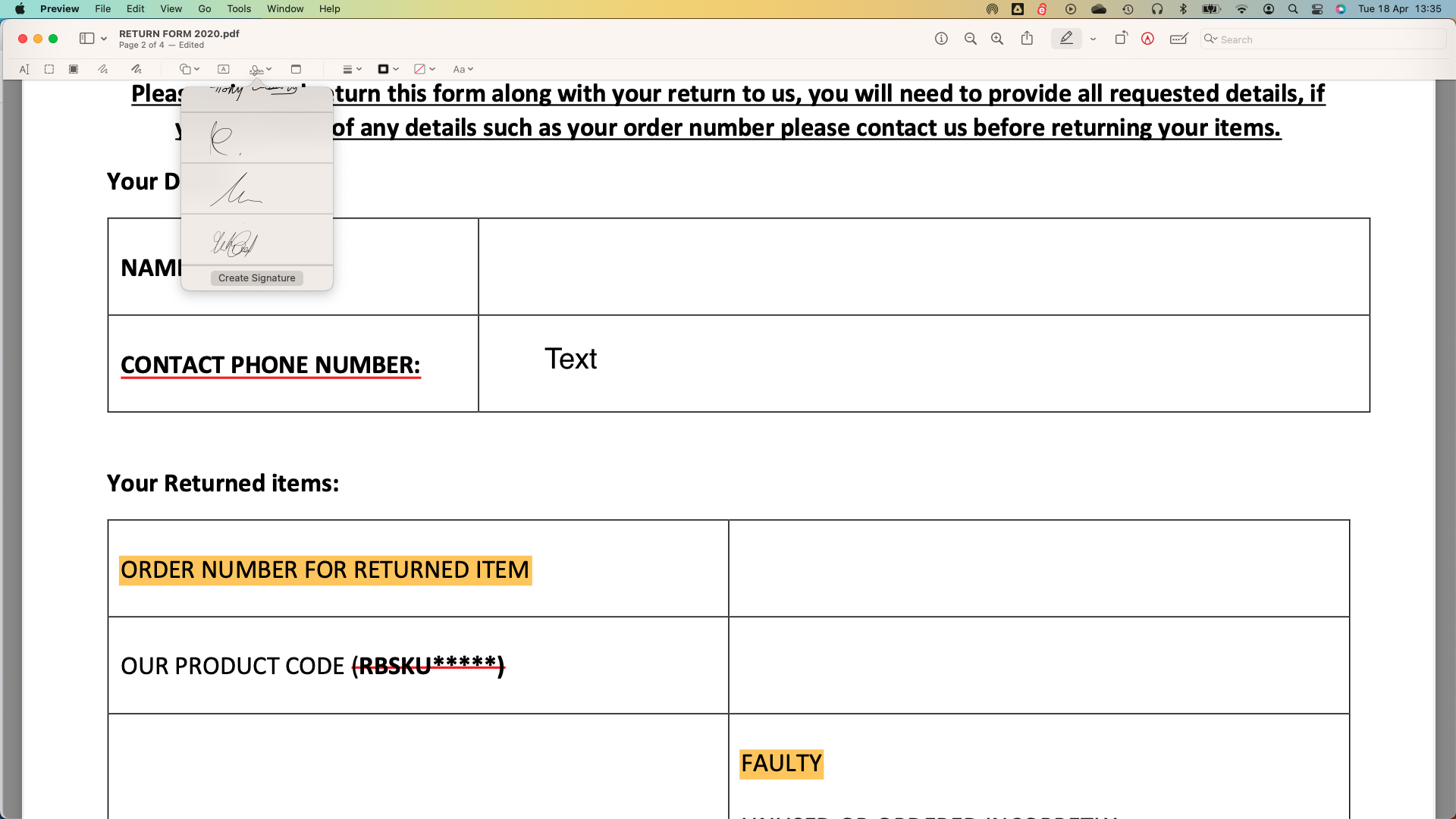
Mac users needn’t look beyond the macOS for their PDF editing needs, since there is a full set of PDF markup tools already available at their disposal in Apple Preview. It has the chops to handle most personal and business PDF editing needs, including encryption, password protection, and permissions for files.
Apple Preview’s PDF features and capabilities are impressive and should be all you need for most common editing tasks. The drawback, of course, is that only Mac users can take advantage of them.
Read our full Apple Preview PDF editor review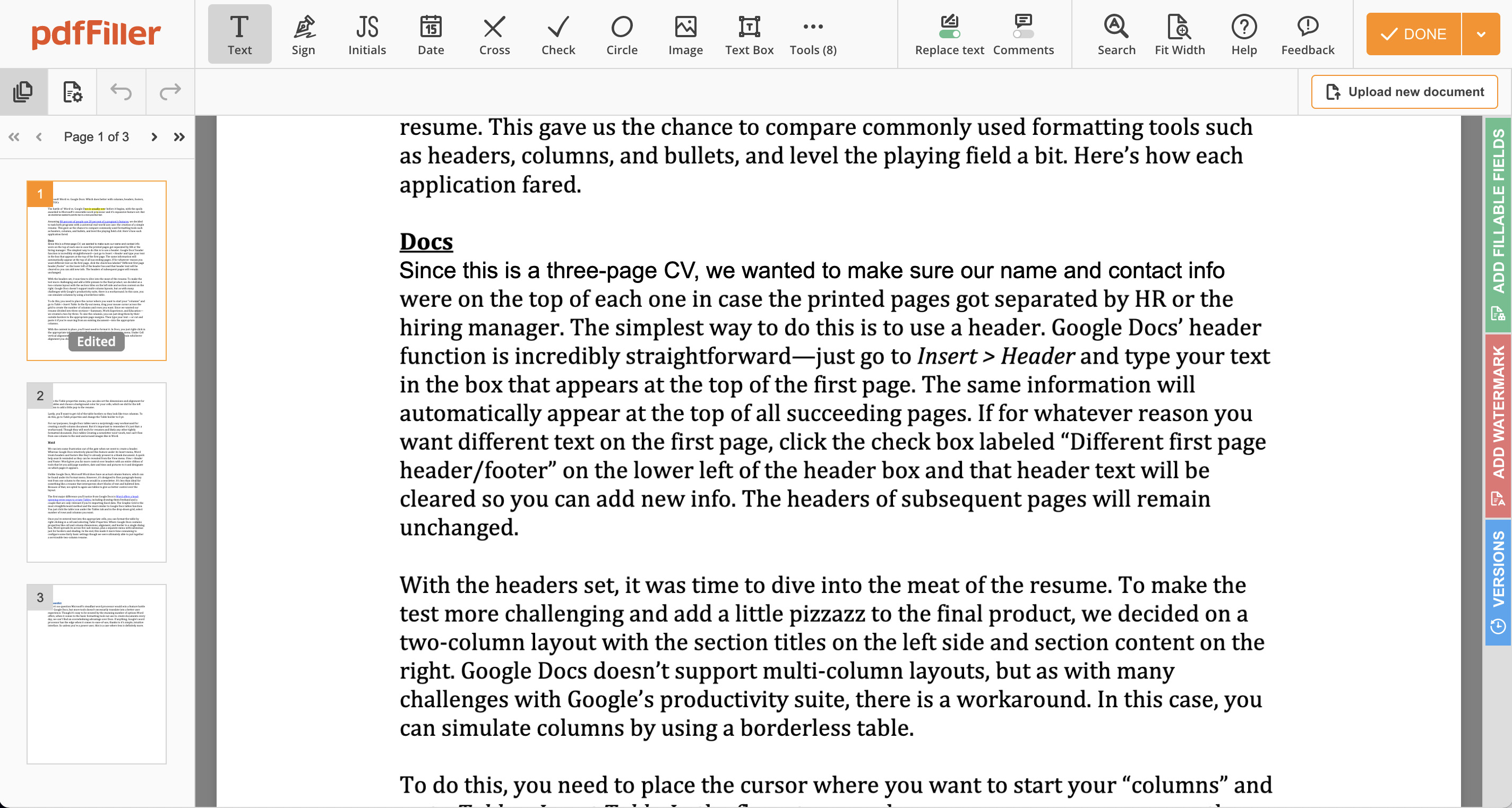
pdfFiller is a browser-based PDF editor that allows you do to just about everything PDF-related—editing, securing, sharing, creating, and storing PDF files—all from its intuitive and simple web interface. Its design is similar to a desktop app, with the toolbar across the top, and document thumbnails along the side, so it’s very easy to select the page you want to work on and perform the desired function, be it adding, deleting, or copying/pasting text; changing font style, size, and color; and so on. A standard set of markup tools is also available. It has a surprisingly deep set of features for both personal and business use. For instance the Premium plan offers an impressive legal document library, as well as SignNow support.
While incredibly versatile, not all of pdfFiller’s advanced features will suit everyone. Fortunately, there are three subscription tiers, which gives users a way to meet their editing needs without paying extra for unnecessary features: Basic for $8/mo; Plus for $12/mo; Premium for $15/mo with an annual commitment. Month-to-month options are also available, but at a higher cost, of course.
Read our full pdfFiller reviewWhy spend a chunk of change on a desktop editor when free online PDF editors abound? The simple answer is because you get what you pay for. Generally, free online editors will let you add text and comments, merge and split documents, and convert files to and from PDF. With rare exception, however, they won’t let you edit existing text and many have file-size and page-volume restrictions. And a lot of them will watermark your edited document. For these reasons, web PDF editors are best reserved for simple, fast editing jobs. Call in these big dogs for anything more demanding.
PDF editors come in a variety of flavors, offering varying feature sets—from basic functionality to power-user tools. It’s important to know what features best match your workflow before you commit to a PDF editor.
The most fundamental function of a PDF editor is to make PDFs, either from scratch, scanned hard copies, or by converting digital documents. A good PDF editor should be able to transform a variety of file types—from Microsoft Office formats to images to HTML—and do so seamlessly, preserving the original formatting. It should also include OCR technology to make the PDF text searchable and editable. Likewise, a good PDF editor must be able to export PDFs into other editable formats such as Microsoft Word and PowerPoint, HTML, or plain text, maintaining the original files hyperlinks, images, and other elements.
Another bit of magic that PDF editors unlock is the ability to modify text; insert, resize, and move images; and reorganize pages in the PDF. A good one will perform these tasks as easily as in a text document or slide deck, allowing in-line editing, dragging-and dropping graphics, and adding or removing hyperlinks.
A good PDF editor should also let you or anyone else using it add comments and other annotations to PDF files during review. It should have tools to mark up both text documents and graphic-heavy files like webpages. Common options include sticky notes, callout boxes, highlighting, freehand drawing tools, and stamps with messages like “approved,” “revised,” and “confidential.”
All businesses deal with documents containing sensitive data. Look for a PDF editor that includes security features that allow access for authorized eyes only. Good options will usually offer several levels of security, including password protection, permissions setting, and content redaction, which “blacks out” selected text and images. Most PDF editors will also offer one or more ways to electronically sign documents.
While deep PDF editing is best done on a desktop, it’s nice to be able to review and annotate files when you’re out and about. While PDFs can typically be reviewed in any PDF reader or editor, regardless of which one they were created in, consider looking for an editor that has a dedicated mobile app, is optimized for mobile devices, or allows cloud access to features through a mobile browser.
One of the great things about a PDF is that it can be read and edited in any PDF program regardless of which one it was created in. So beyond the features outlined here, let your personal preferences guide you in making your decision.
While there are a number of different types of PDF file formats, they all fall under the umbrella term of PDF documents. A PDF form is a type of PDF document that has editable form fields a user can fill out. Typically, parts of the document are static and can’t be changed in a PDF form, such as questions in a survey or instructions about filling out the form. In a PDF form, the content fields a user fills out are open to editing and can offer a list of possible answer options or can be written in freely.
Yes. They are two entirely different document formats. While you can export from one file format to another, they are not the same. Word file formats are usually used for word processing, editing, and making changes to text. PDF documents on the other hand, are most often utilized for viewing, sharing, and printing. Additionally, Word files are read and write and contain some version of the “.doc” file format. Whereas PDF files are typically read-only and contain the “.pdf” file format.
Yes. If you have a PDF document that you don’t want anyone else to edit, you can protect the file. You can do this by opening the file in Acrobat, for instance, and clicking Tools > Protect. Then you have a few options as to whether you want to simply restrict editing with a password, or if you want to encrypt the file for further safety. Once you choose how you want to protect the PDF document, you can set a password and save.
As a matter of fact, many free PDF editors allow you to merge two or more PDFs into one document. Such is the case with our top free pick PDF Candy. Open up the PDF editor application or website in your browser and search for the Merge option. It will then ask you to add the files of all PDFs you wish to merge. Once the files have been added, arrange the page order and alignment before proceeding with the merge. Afterwards, all of your previously PDF files will be merged into one new PDF document.
Yes and no. Google doesn’t provide a designated free PDF editor itself, but there are third-party Chrome extensions that you can use to help get the job done. Alternatively, you can make use of Google Drive to edit a PDF document. Simply upload the document onto your Google Drive and then select the file and right-click and select Open with > Google Docs. The file will be opened as an editable Google Docs text document. Then just make your edits and when you’re finished click File > Download >PDF Document to revert it back to a PDF file.
This method is a quick and easy way to edit a simple PDF document, but be careful as Google Docs can run into formatting issues if your original document has complex visual formatting such as tables and graphs. In this case, it is best to use a designated free or premium PDF editor.